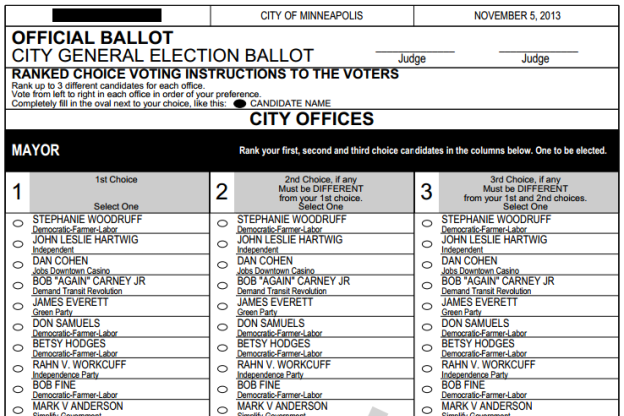
Responses to selected feedback on my last Ranked Choice Voting post
I got a few responses to my previous post on Ranked Choice Voting that deserve to be addressed, so that’s what I’ll do.
Starting with:
The author here has a few misunderstandings of the process. The Minneapolis rules provide for batch elimination for all the candidates that cannot mathematically win. This will weed out the lowest vote getters early on and reduce the rounds of counting.
This is correct, as it clearly states on the City of Minneapolis website:
If no candidate received more than the required threshold of first choice votes, the ranked choice process kicks in. The candidate who received the lowest number of votes is eliminated, along with any candidates who have no mathematical possibility of winning. Their votes are reallocated based on the second-choice votes on those ballots. If that process leaves one candidate with more than the required threshold of votes, that candidate is declared the winner.
This sort of blows up my contention that there could be upwards of thirty rounds of balloting, as I would imagine that most candidates will not have a mathematical possibility of winning. This doesn’t change how the votes will actually be counted or any part of my analysis other than the number of counting rounds that will take place however.
@tonyangelo Back up a minute. If all the candidates I rank are eliminated my whole ballot is thrown away? Does my vote count?
— Kevin Watterson (@kwatt) October 15, 2013
No, your ballot is not literally thrown away, it’s set aside. And yes your vote did count, at first, but now that all of your candidates have been eliminated it no longer counts. This is no different than voting for a candidate who doesn’t win a classic election, your vote still counts the same amount in both cases.
This is a key point as I made a joking reference to exhausted ballots being thrown in the recycling bin (you can retrieve stuff from there!) in the previous post. I don’t think it’s fair to conclude your vote doesn’t count just because all of your candidates were eliminated and your ballot is no longer part of the counting. You still had your say in the election just as much as you would in a classic election.
With RCV we should consider each round a “virtual primary” and compare the winner’s votes to the total votes in the final round only. After all, in a traditional election we don’t complain that so-and-so only got 30% of the votes for primary and general elections combined; we look just at the general election. So, RCV will usually result in a winner with a majority of the votes.
[this commentor had a longer comment, the latter parts of which will be addressed in a future post dealing with those issues, this graf does fine on its own though for this post.]
I understand the argument for why it’s incorrect to use the overall number of ballots cast to figure out a vote share for the winning candidate. I just don’t think it’s that strong of an argument.
First of all, the “virtual primary” in a Ranked Choice election results in a gradual winnowing down of the field of votes from round to round. In a classic primary-general election, the field of votes grows quite a bit from the primary to the general. In Ranked Choice Voting you have the greatest number of peoples voices being heard in the earliest rounds, and the least number of peoples voices being heard in the latest rounds, the exact opposite dynamic that is at play in a classic election.
Also, in a primary-general election situation, someone’s preferred candidate could lose in the primary and that person would still have a chance to make a decision on the general election. In Ranked Choice Voting you really have no way of knowing whether your ballot will still be around on the last ballot, and thus whether you will have a choice on the final round of balloting. If the point of Ranked Choice Voting is to be a “virtual primary” process, it doesn’t really do a very good job of behaving like one.
But regardless of any of that, the simple reality is this; X number of people will cast ballots in November for Mayor of Minneapolis and there is a very good chance that the winner will end up with less than X/2 ballots. That is not a majority.
The reason I keep going back to this point isn’t because I care deeply about people winning elections with a majority. What I am concerned about are the motivations of the groups pushing Ranked Choice Voting by using dubious talking points. If Ranked Choice Voting really was the cats meow why do it’s supporters have to resort to bullshit talking points to prop it up?
Look at it this way, the system that Minneapolis had in place prior to Ranked Choice Voting guaranteed that the winner got a majority (excluding a tie) without having to change the definition of what a majority is in the process. That’s because there were only two general election candidates and with only two candidates, unless it’s an exact tie, someone will have a majority.
Compared to that system, no, Ranked Choice Voting does not “Uphold the principle of majority rule.“
Thanks for your feedback. If we like what you have to say, it may appear in a future post of reader reactions.


